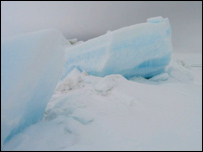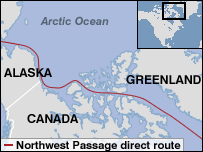|
|
 |
|||||||||||||
|
Recent reports are disturbing: Date: 22nd November 2007. IPCC now concerned about climate change rate and urgent action is required. Keep abreast of what is happening from Bali conference coming soon. Try this link to see who is doing what! http://unfccc.int/2860.php |
|||||||||||||
|
We seriously recommend that if you are at all interested in this then keep watch on the Diary link on the BBC's web site here and we thank them for bringing this out! That's why we're here. Every scientist we meet is stunned by the speed of change. The latest forecast had suggested that this year's scale of melting would not come till 2040.
|
|||||||||||||
|
Ice melt raises passage tension
Record summer melting of sea-ice has made the passage fully navigable; and immediately escalated a dispute over who controls the route. Canada maintains the waterway that connects the Atlantic with the Pacific lies within its territorial waters. It has backed that up with plans for a new military base in the Arctic. However, the United States, and other countries claim international rights to use the route for shipping. Big melt In an interview with BBC News, the head of the Canadian Coast Guard, George Da Pont, said: "Our view is that it's our territorial waters and that we govern it accordingly. Obviously the Americans and some European countries have different views. "I assume at some point in time they'll get settled but we're pretty confident that they're Canadian territorial waters and that we should be regulating and asserting our control over them as we would over any other part of our territorial water. "It's critical, it's part of our history; like any country it's important to assert your control over your country and your territorial waters." His statement comes as polar experts are still reeling from the dramatic loss of Arctic ice this summer. The Canadian Ice Service was among the organisations monitoring the retreat and its director, Doug Bancroft, told the BBC that he was "stunned" that this extent of melting had not been expected for decades. "It just seemed as if it wasn't going to stop. Normally, towards the end of August, the beginning of September, the melting slows down and stops and we get ready for the coming fall and the refreezing during the winter. But it just kept on going and the concern was, 'Well when is it going to stop this year?' - and ultimately when it did stop, it shattered all previous records." Research cruise On Monday, the Canadian Coast Guard is preparing to send one its research vessels, the Amundsen, through the Northwest Passage with about 40 scientists on board. Equipped with a remotely operated robot submarine and a sonar system, the ship will undertake a detailed survey of the sea-bed - essential if the waterway is to become more open to commercial shipping.
A British team on board will study the sediment on the sea-bed to hunt for a chemical record of changes in the ice stretching back for the past thousand years - a vital task to help understand the likely rate of change in the future. BBC News will join the ship for its journey through the Northwest Passage. The route is at - or beyond - the limits of satellite coverage but the plan is to provide regular updates wherever possible. Now from Dr Sherwood. Sea ice holds the land based ice back if we see a dramatic reduction of sea ice mass then each year it reduces further so then we have less mass holding the land ice back plus the fact that air temps are on a dramatic rise so melts are also on the increase. Thus ocean levels rise, extra moisture in the atmosphere as oceans rise causes compression values in the atmosphere to also rise thus larger more violent storms. Just a few thoughts to consider guys and gals!So I shall say it again global conditions are about to get nasty! Ice will continue to melt at an accelerated rate and so to will rain fall in different areas. Temps in seasonal times will be higher than normal so more records broken and so the situation continues all for the sake of the mighty dollar. Time to worry those politicians out there who do not GET IT YET! Stop listening to those scientists who walk about with their eyes shut. Get real and get aware about what is really going on around the planet right now!
|
|||||||||||||
|
(c) Copyright 1993-2008 Rajon Publishing |
|||||||||||||

